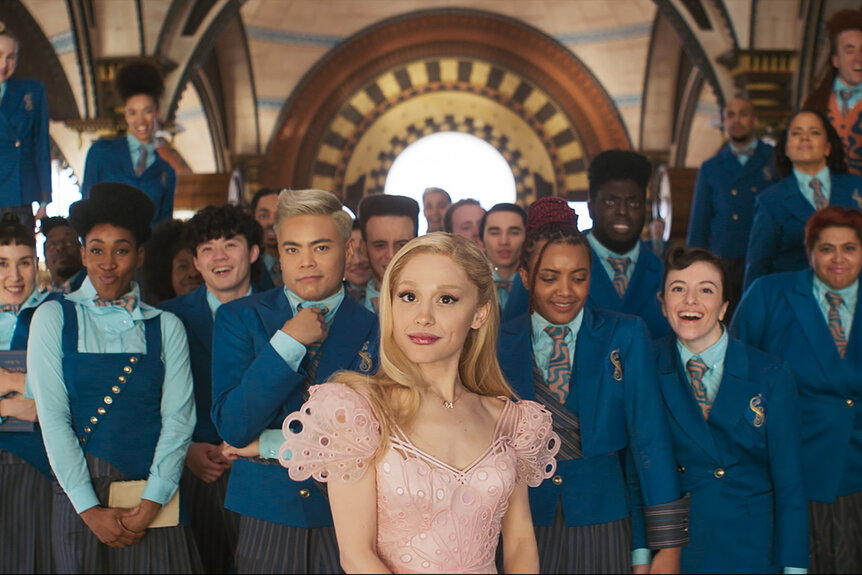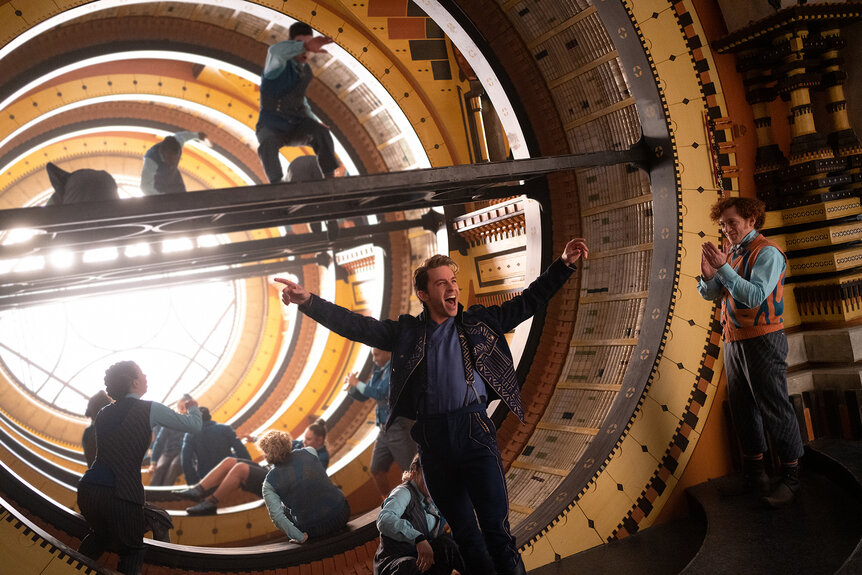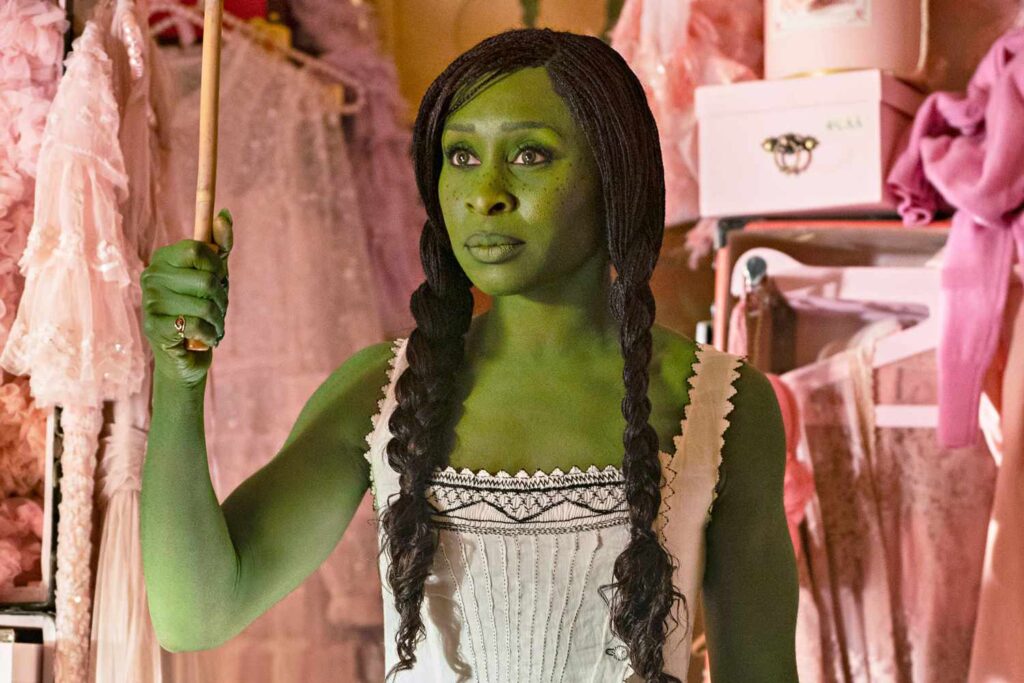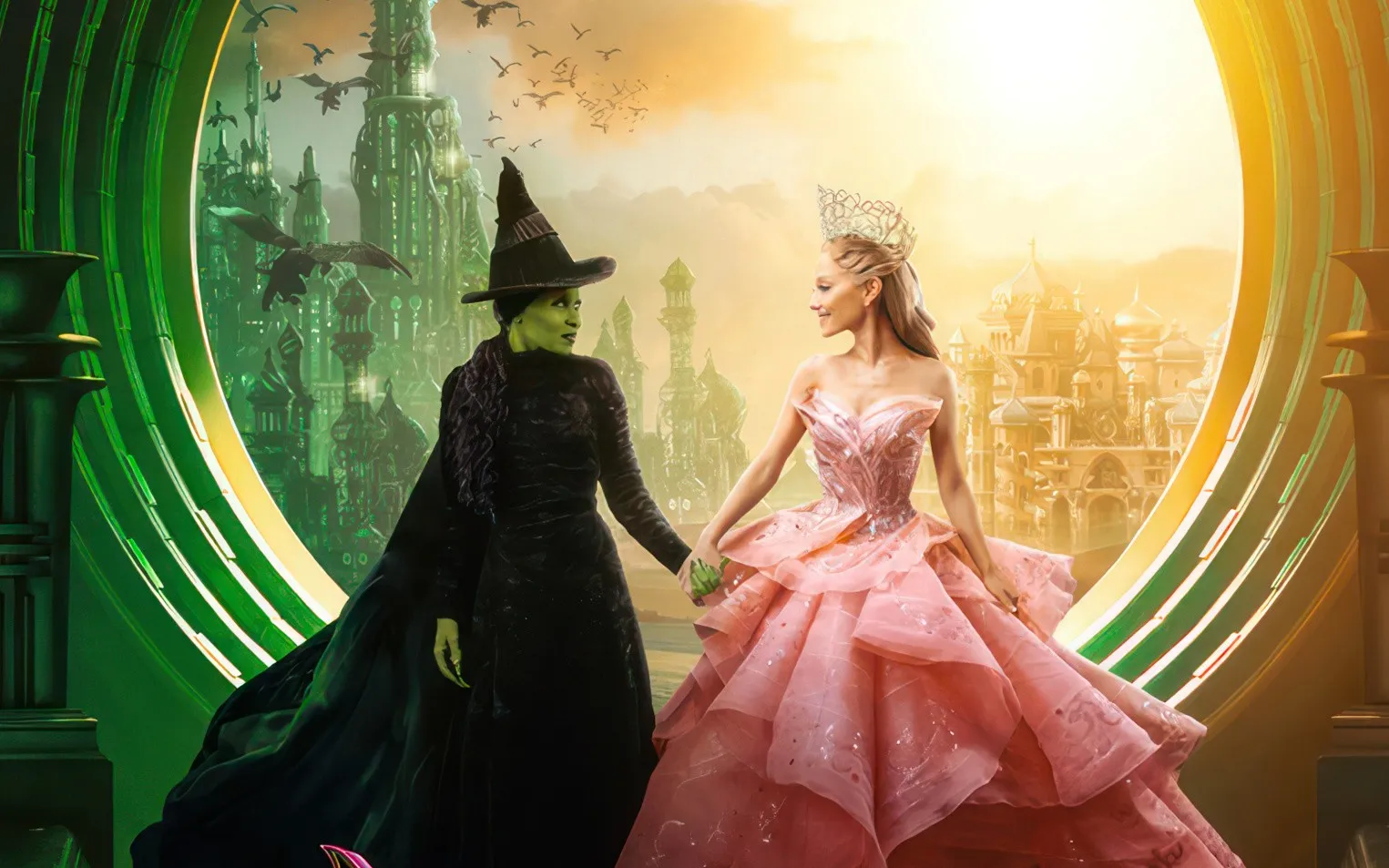Great news for fans of the iconic Broadway sensation Wicked—and honestly, for anyone who loves great entertainment: Jon M. Chu’s highly anticipated big-screen adaptation of the 2003 musical phenomenon doesn’t just deliver the goods; it soars. Arriving as one of 2024’s best studio pictures, Wicked is a lavishly crafted spectacle that reminds us why Hollywood magic still matters. Chu’s first installment of this movie double act (to conclude Fall of 2025) is a triumph and the finest screen musical since 2002’s Chicago hoofed its way to Oscar. It also manages to improve on its stage origins, excelling in nearly every conceivable way (though let’s get real—Kristin Chenoweth and Idina Menzel will always be its definitive standard bearers).
For the uninitiated (all one or two of you), Wicked is the blockbuster musical from Stephen Schwarz that reimagines the Land of Oz in clever and transporting ways. Based on Gregory Maguire’s 1995 novel Wicked: The Life and Times of the Wicked Witch of the West, it’s a revisionist take on two iconic characters you thought you knew: Glinda, the sweet Good Witch of the North, and her infamous green-hued counterpart, the Wicked Witch of the West. In the 1939 classic The Wizard of Oz, they were played by Billie Burke and Margaret Hamilton as binary paragons of kindness and villainy (many of us are still terrified by Hamilton’s cackle)—but not so fast. Wicked turns the tables, and their backstory is richer than the famous fairy tale we remember.

The film adaptation has been augmented by screenwriters Winnie Holzman, who wrote the Broadway book, and Dana Fox. Its generous, 161-minute runtime feels like a perfect match for the film’s larger-than-life, unabashedly over-the-top vibe—a compliment, by the way. The sheer creativity in its visuals, from the inspired set designs (which were actually built, not CGI-created) to lovingly intricate costume details, could have easily overshadowed the music and performances. Yet Chu doesn’t just capture grandiosity; his camera observes an intimacy that balances the epic scale with the heartfelt in a way perhaps even the stage can’t match.
Like that stage production, Chu’s Wicked is a story of empowerment, set in a magical boarding school where two young women’s paths collide to shape their futures. Galinda Upland (pop star Ariana Grande) is a polished, privileged beauty queen, while Elphaba Thropp (Cynthia Erivo) is a green-skinned outcast, sensitive and misunderstood from birth.
The picture begins with the aftermath of an iconic movie moment, and all we need to see is a black witch’s hat and a small pool of water to recall that a nice little Kansas girl has done a great humanitarian deed. Suddenly, a vision—Grande’s Glinda (along the way she drops the “a”) appears in a flying, pink champagne-tinted bubble to address a jubilant village of munchkins celebrating the demise of the Wicked Witch of the West. From there, Glinda recounts a reflective tale of her school days, where an unexpected friendship sets the course for a pair of intertwined destinies.
Elphaba, as brought to life by the terrific Erivo, is an unintentional standout from the moment she steps foot in Shiz University, Oz’s answer to Hogwarts. Among the callously superficial student body, she’s the sharpest and most perceptive—but also the most isolated. With her emerald skin, Elphaba arrives friendless, while her younger sister Nessarose (Marissa Bode), who uses a wheelchair, is their father’s favorite. Elphaba, meanwhile, is nobody’s favorite—until imperious headmistress Madame Morrible (Michelle Yeoh) spots her raw power and offers her mentorship, a position that entitled Galinda assumed was hers.
Rooming together turns Elphaba and Galinda into reluctant odd-couple allies—Galinda, all frothy pink perfection, and Elphaba, stoic in her signature black. The dynamic takes a new twist with the arrival of Fiyero (Jonathan Bailey, channeling peak charm in appealing trousers), a roguishly handsome, high-born prince turned student whose swagger captures the hearts of both would-be witches (and amusingly that of their buddy, SNL-alum Bowen Yang).
While such antics prove fun, Wicked tackles a deeper story of how society treats its outsiders, Elphaba’s journey dovetailing with a subplot about fear and oppression (“The best way to bring folks together is to give them a common enemy”), here the plight of the talking animals of Oz (effective CGI creations seamlessly blended with live actors) who are caged and rendered voiceless. Chief among them is Dr. Dillamond (voiced by Peter Dinklage), a brilliant goat and history professor and object of cruel persecution. This story of the courage to challenge a world that fears what it doesn’t understand fits right into Elphaba’s emerging social conscience while calling to mind our current hellfire political landscape of demonized immigrants.

Elphaba and Galinda improbably bond in two standout musical moments. The exuberant Popular is a showstopper—here gorgeously staged in a shower of glittery pink and a true showcase for Galinda’s (and Grande’s) bubblegum charm. And a school dance becomes a remarkably tender sequence where gentle choreography says what words cannot, lending the large scale film real human feeling as a mortified Elphaba is rescued by Galinda’s good graces. Ditto the heartstrings ballad I’m Not That Girl, Elphaba resigned to bury her budding feelings for Fiyero.
Fiyero himself brings down the house with doozy of a fun number (women and gay audience members are sure to swoon), the strutting Bailey playing his “callous and shallow” charmer to the hilt in Dancing Through Life, one of high points of the movie year. Staged by Chu with an impressively light touch and set within the elaborate Shiz library—a feat of construction courtesy by ace production designer Nathan Crawley, with its huge, moving, cylindrical archives and ladders—the number enjoyably eschews academia (books that Bailey opens with his feet before promptly walking upon) in favor of innocuous fun (“Stop studying strife and learn to live the unexamined life!”). Why not? And in the spirited What Is This Feeling?, choreographer Christopher Scott’s ensemble footwork recalls the energy and flair of a classic movie musical production number.
Soon Elphaba receives the ultimate invitation—to meet the Wizard himself, who turns out to be a self-admitted fake more interested in keeping Emerald City in thrall to his cult of personality. And special mention to that Emerald City, an extravagant set accommodating so much life—hundreds of extras, every shade of green imaginable and a terrifically fun public square theatrical with a pair of inspired cameos. This super-sized set, from the intricate village commons to the wizards’s massively palatial chambers, is an eye-popping design achievement; I was gobsmacked by a gargantuan, climactic shot of Yeoh addressing a cadre of winged monkeys, its design and framing of epic invention. As for the wizard, played with a wink by Jeff Goldblum, his encounter (which includes a magically conceived expositional diorama) with Elphaba sets the stage for the film’s musical apex, a little number named Defying Gravity. A theatrical touchpoint known for its audience wowing levitational stagecraft, Chu ingeniously reimagines the anthem here as the installment’s climax, sending Elphaba—and us—to the stratosphere in the year’s most exhilarating commercial movie sequence.

Erivo, a Tony winner for her searing portrayal of Celie in the 2015 Broadway revival of The Color Purple and acclaimed for movie roles in Widows and Harriet, brings intelligence and depth to Elphaba, capturing the character’s evolution: the ache of lifelong alienation, the warmth of friendship and the quiet romantic yearning. When Elphaba claims her identity as a defiant “outsider” Erivo’s performance literally takes flight (the actress did her own stunts and live singing, as did the company), and cinematographer Alice Brooks frames this transformation with big canvas compositions giving the character’s self-actualization impressive frame (and emotional) authority.
But the bigger revelation may be the delightful Grande. As Galinda, she proves an effortlessly sharp comedienne, wringing laughs from every exaggerated gesture, over-enunciated word and blissfully ditzy quirk. Yet her performance gradually transcends caricature, blending humor with genuine heart. Beneath Paul Tazewell’s impeccably detailed costumes and Frances Hannon’s coiffed-to-perfection hair (which included more than 3500 wigs across the production), Grande reveals a character with depth, enlivening her with deft physical comedy and self-effacing charm.
A transporting big screen experience, Chu’s massively entertaining picture is a reminder that large scale films, in recent years polluted by soulless cynicism, can still produce what used to be known as genuine movie magic. He generated the same in his sophisticated 2018 comedy Crazy Rich Asians (a stream of water unexpectedly running down a wedding aisle was a sublime touch) and his rousing 2021 movie musical adaptation In the Heights, which like Wicked deftly deployed big production numbers and personal feeling.
Wicked is imaginatively mounted, expertly performed and richly felt; it’s a complete package. Anticipate the film—along with Chu, Erivo, Grande and the film’s masterful artisans—to cast a spell on this year’s Oscars race.
4 stars



